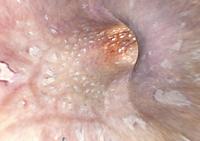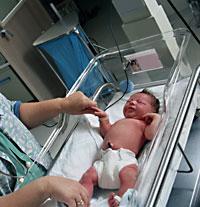Our little ones
2006/06/15 Carton Virto, Eider - Elhuyar Zientzia

However, more than by quantity, they deserve the attention for the help they offer us. Intestinal microorganisms play a fundamental role in digestion: without them many compounds we could not decompose them, nor form many essential compounds for us, such as vitamins and amino acids. That is, without them we could not live, there would not be us without them.
For this reason, some scientists see and analyze man as a result of this sum. For example, from this perspective, researchers from universities and research institutes in the United States have analyzed the genome of our intestinal microorganisms, a small part for the moment, and have released the first analysis of the human microbiome a few days ago. As for the concrete results, they point out that thanks to the genome of microorganisms they have enriched the genetic information corresponding to the metabolism of many compounds. But they wanted to highlight the idea of unity above all, that the human genome is the amalgam of the genes of the human genes and of the microorganisms of the body, with which we should analyze and understand human biology.
Other less conceptual studies have been published these days. One, in addition, is done by some of the members of the previous group. In this case, they have worked with the children: 14 newborn children have followed a year to see how the community of intestinal microorganisms changes and what heritage our first relationship with microorganisms leaves us. In fact, most research indicates that, at the time of birth, this first relationship is maintained. It may not be a hygienic image, but from the vagina and feces of our mother we take the first microorganisms that will then form part of our intestinal flora. And when taking breast milk, we also take microorganisms from the skin. In this study, they have seen that the relationship between children and samples of mothers is clear, and that this first relationship leaves a certain firm in the future, even though the microbial community of children grows increasingly similar to that of adults. We do not know if the importance of this firm is large or small, but those who carry out these investigations consider that it is great, although they have recognized that it is still a mere speculation to draw those conclusions from the results.

Speculations have gained special importance in the investigation of births by caesarean section, in which the child does not have this first option to ingest microorganisms. Consequently, they fail a step that seems important. To what extent is it important? And it is that, although it is born by C-section, there are many sources of obtaining microorganisms. Some clues to answer the question have been provided by a study conducted in Germany with mice. During the research, the immune response of newborn mice to the microorganisms of the maternal bowel has been studied, and it has been found that the cells of the embryos reacted against, while the cells of the intestine of the mice of a day were empty, and that in the first two hours of life the mice born naturally showed the signs of an immune response, unlike those born of Caesarean. Hence, microorganisms ingested at birth can act as initiators of the immune system.
Time and deeper studies are going to say what is beyond these speculations. Meanwhile, let our txikis continue to work.
Published in the newspaper Berria.




